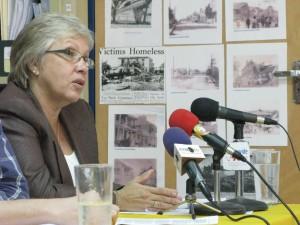Between now and 2015 a new development framework is being established to replace the Millennium Development Goals, the blueprint agreed to by all the world’s countries and leading development institutions to meet the needs of the world’s poorest. The deadline set for achieving these eight goals is 2015. As the milestone approaches, attention is now focused on what should follow the MDGs in the post 2015 period. The decisions in this regard will be guided largely by priorities advanced by governments, civil society and development organizations. In keeping with the Programme of Action of the International Conference on Population and Development, (ICPD PoA), UNFPA is steadfast in its commitment to ensuring that reproductive rights and sexual and reproductive health are placed at the centre of governments’ development agenda in the post 2015 era.
The Fund has been working with civil society organizations to build their capacity to advance the issues, including the rights of adolescents and youth, which encompass their right to attain the highest standard of health, including sexual and reproductive health; and the prevention of gender based violence. One such meeting was held on Tuesday, April 23 at the Terra Nova Hotel in Kingston, Jamaica. Over 44 representatives from 24 civil society organizations across Jamaica, including youth, faith-based, women’s and men’s, groups, as well as community groups and academia participated in the meeting, which focussed on building advocacy skills to advance the ICPD agenda, beyond 2014.
A highlight of the day was the sharing of good practices in Advocacy by civil society group, Jamaicans for Justice, and a representative to the Commission on the Status of Women (CSW), held at the United Nations in March. Dr. Carolyn Gomes, Executive Director of Jamaicans for Justice spoke about the strategies used by Jamaicans for Justice to influence the passing of the Access to Information Act in Jamaica, which has in effect changed the culture of secrecy surrounding government information. She stressed the importance of building coalitions, working together with groupings and individuals that share a common interest. “It’s better together,” she said.

Mrs Joyce Hewett, of Woman Inc., shared some of the approaches used by the Caribbean delegation to advance the position of the Caribbean on sexual and reproductive health and rights in the conclusions of the CSW. For her, being strategic and committed are key prerequisites for successive advocacy, especially, since the desired changes sometimes take a long time to be realized.
UNFPA has been leading the implementation of the1994 ICPD (PoA), which is recognized as a precursor to, and prerequisite for the achievement of the MDGs. The ICPD (PoA) focuses on population and development related issues, including a dvancing gender equality and empowerment of women; promoting sexual and reproductive health, including maternal health; increasing access to education, especially for girls; promoting understanding of the links between population dynamics, development and poverty. This development framework comes to an end in 2014 one year before the MDGs.
To assess progress made, UNFPA has embarked on a series of reviews of the ICPD action plan. The aim is to assess the achievements made, gather evidence of what has worked and to investigate where challenges remain. The primary tool for gathering this information is the ICPD Global Survey, as well as civil society consultations and a series of thematic conferences. Key stakeholders in this process include governments, civil society organizations and partners. UNFPA has been sensitizing governments and, civil society organizations, particularly those working in the areas of reproductive health and gender to the significance of the reviews and the critical importance of participating in the process to ensure that the voice of the Caribbean is reflected when decisions are being made regarding what needs to be done to deliver a more equal, more sustainable world for all. Thirteen of the twenty-two countries supported by the UNFPA Sub-regional office for the Caribbean completed the ICPD global survey.

